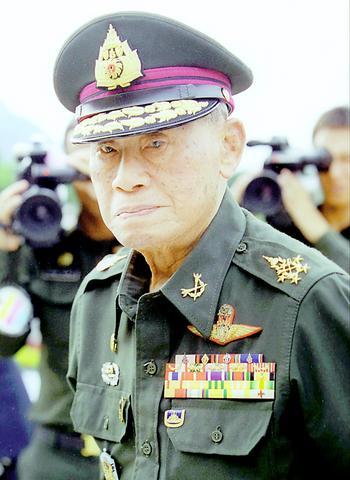Thanom Kittikachorn, a former prime minister whose military regime was ousted from office by a popular uprising in 1973, has died, the state-run news agency said. He was 92.
Thanom died of shock and heart failure late Wednesday after spending five months at Bangkok Hospital, the Thai News Agency reported, citing a hospital announcement early yesterday morning.
Thanom came to be popularly reviled as one of the country's "Three Tyrants" when he ran the country as a military dictatorship in a triumvirate in the 1960s and early 1970s with Field Marshal Praphas Charusathien and Colonel Narong Kittikachorn, Thanom's son and Praphas' son-in-law.

PHOTO: AFP
Thanom, who also held the rank of field marshal, was generally seen as the more conciliatory partner, and Praphas the hardliner.
The three were driven into exile following a bloody student-led uprising in October 1973.
They were accused of nepotism, massive corruption and ordering the massacre of protesters in the streets of Bangkok during the uprising.
A brief period of raucous democracy followed, which many influential and conservative Thais found unsettling, and feared would lead to a communist takeover similar to those that occurred in Vietnam, Laos and Cambodia in 1975.
Thanom was allowed to return to Thailand in late 1976 to serve as a Buddhist monk, sparking new demonstrations by pro-democracy protesters. Many believe his return was meant to set the stage for a counterrevolution, and on Oct. 6, 1976, a massacre of student protesters by police and the army took place at Bangkok's Thammasat University, and a coup installed a new, military-guided right-wing government.
Neither Thanom nor his two former partners in rule resumed any public political role. Thanom generally kept a low public profile afterward, though over the past decade, he made an effort to rehabilitate his public image -- arguing that he was not responsible for the violence unleashed on the 1973 protesters -- and sought to recover some property seized when he was overthrown. Praphas died in 1997.
Thanom was born Aug. 11, 1911 in the northern province of Tak. He attended Army Cadet Academy and his move up the ranks was accelerated after he took part in a 1947 coup.
During the 1950s Thanom served as deputy defense minister and defense minister, and was appointed a figurehead prime minister for nine months in 1958 before military strongman Sarit Thanarat assumed dictatorial powers until his death in 1963.
Thanom's regime -- like Sarit's -- was close to the US because of their shared drive against communism, and massive corruption. During the Vietnam War, his government allowed tens of thousands of US servicemen to be stationed in the country. The US bases were closed after his government was overthrown.
His government allowed a veneer of democracy, but even the mild dissent proved unacceptable to it, and it staged a coup against itself in 1971 to sweep away peaceful but pesky opponents in parliament. However, the high-handed tactic sharpened opposition to his rule, leading to the 1973 student revolution.

A fire caused by a burst gas pipe yesterday spread to several homes and sent a fireball soaring into the sky outside Malaysia’s largest city, injuring more than 100 people. The towering inferno near a gas station in Putra Heights outside Kuala Lumpur was visible for kilometers and lasted for several hours. It happened during a public holiday as Muslims, who are the majority in Malaysia, celebrate the second day of Eid al-Fitr. National oil company Petronas said the fire started at one of its gas pipelines at 8:10am and the affected pipeline was later isolated. Disaster management officials said shutting the

US Vice President J.D. Vance on Friday accused Denmark of not having done enough to protect Greenland, when he visited the strategically placed and resource-rich Danish territory coveted by US President Donald Trump. Vance made his comment during a trip to the Pituffik Space Base in northwestern Greenland, a visit viewed by Copenhagen and Nuuk as a provocation. “Our message to Denmark is very simple: You have not done a good job by the people of Greenland,” Vance told a news conference. “You have under-invested in the people of Greenland, and you have under-invested in the security architecture of this

Japan unveiled a plan on Thursday to evacuate around 120,000 residents and tourists from its southern islets near Taiwan within six days in the event of an “emergency”. The plan was put together as “the security situation surrounding our nation grows severe” and with an “emergency” in mind, the government’s crisis management office said. Exactly what that emergency might be was left unspecified in the plan but it envisages the evacuation of around 120,000 people in five Japanese islets close to Taiwan. China claims Taiwan as part of its territory and has stepped up military pressure in recent years, including

UNREST: The authorities in Turkey arrested 13 Turkish journalists in five days, deported a BBC correspondent and on Thursday arrested a reporter from Sweden Waving flags and chanting slogans, many hundreds of thousands of anti-government demonstrators on Saturday rallied in Istanbul, Turkey, in defence of democracy after the arrest of Istanbul Mayor Ekrem Imamoglu which sparked Turkey’s worst street unrest in more than a decade. Under a cloudless blue sky, vast crowds gathered in Maltepe on the Asian side of Turkey’s biggest city on the eve of the Eid al-Fitr celebration which started yesterday, marking the end of Ramadan. Ozgur Ozel, chairman of the main opposition Republican People’s Party (CHP), which organized the rally, said there were 2.2 million people in the crowd, but